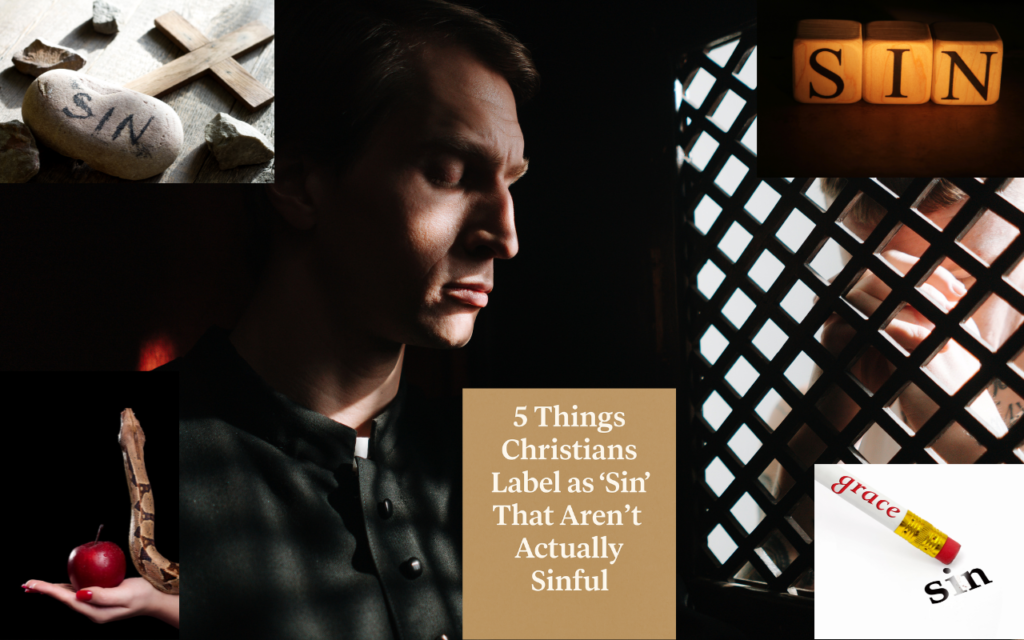
When Well-Meaning Christians Get It Wrong
Have you ever been shamed by another Christian for something that didn’t feel sinful, but you couldn’t quite explain why? Maybe it was a glass of wine at dinner, a strong emotional response, or even a friendly dance at a wedding.
As a Christian writer deeply invested in helping believers live in truth and freedom, I’ve seen how mislabeling things as sinful can damage faith, relationships, and even mental health.
This blog will expose five common things Christians often mislabel as sin—things the Bible does not condemn. We’ll explore why it happens, how it hurts, and what Scripture really says.
Most importantly, we’ll learn how to trade fear-based faith for wisdom-based freedom.
1. Drinking in Moderation: A Glass Isn’t a Gateway
Let’s be honest—many Christians think any alcohol is off-limits. But is it?
The truth: The Bible clearly warns against drunkenness, not drinking itself (Ephesians 5:18, 1 Timothy 3:3). Wine was celebrated in Scripture (Psalm 104:14–15), used in Jesus’ first miracle (John 2), and included in communion (Matthew 26:27–29).
The problem: When Christians say “all alcohol is sinful,” they add a rule God never gave. This can cause unnecessary guilt and division—especially for believers who responsibly enjoy a drink with friends.
Instead of legalism, let’s promote wisdom and personal discernment. Some may choose to abstain—and that’s good too.
Question for You (Poll):
Do you believe Christians can drink alcohol in moderation without sinning?
-
Yes
-
No
-
Unsure
2. Strong Emotions: Feeling Isn’t Failing
Have you ever been told that your sadness, anger, or anxiety was a “sin”?
Here’s the truth: Emotions are not sins. Even Jesus wept, felt deep sorrow, and expressed anger (Matthew 26:38, John 11:35, Mark 3:5).
The danger: When we treat feelings like moral failures, we ignore that emotions are part of being human. Worse, we may shame people suffering from depression or anxiety—pushing them away from healing.
Let’s reframe the conversation. Instead of blaming people for feeling, let’s walk with them toward restoration.
Reflection Quiz:
Which of these emotions did Jesus express in the Gospels?
-
A. Joy
-
B. Sorrow
-
C. Anger
-
D. All of the above
👉 (Correct answer: D)
3. Dancing: The Joyful Movement Christians Forgot
Some churches forbid dancing altogether. But Scripture doesn’t.
Instead, the Bible celebrates it. Psalm 149:3 and Psalm 150:4 encourage dancing as worship. Ecclesiastes 3:4 reminds us there’s a time to dance.
So why the fear?
Because dancing sometimes occurs in environments linked to sin—like drunken parties. But context matters. Not every dance is sinful. Weddings, family celebrations, or dance classes can be joyful and pure.
Let’s not throw out a beautiful expression of joy because of fear.
4. The Billy Graham Rule: Wisdom, Not a Command
This rule says a man should never be alone with a woman who isn’t his wife. It began with Billy Graham’s ministry to avoid scandal. It’s wise. But it’s not Scripture.
The issue? When Christians elevate this rule to moral law, it can harm women professionally—especially in ministry or leadership roles.
Balance matters. We must pursue integrity, yes—but not at the cost of fairness, trust, or effective teamwork.
Ask yourself: Is this wisdom or is it becoming legalism?
5. Disagreeing on Non-Essentials: Not a Sin, Just a Difference
You may love deep theology. But have you ever judged someone who didn’t believe the exact same things you do?
Many Christians do. Whether it’s predestination vs. free will, worship style, baptism method, or end-times views, we often treat non-essential disagreements like spiritual failures.
But here’s the truth: These differences fall within the bounds of orthodox Christian faith. Disagreeing doesn’t make someone less godly.
Romans 14 teaches us not to pass judgment on disputable matters. Let’s extend grace and unity, even when we differ.
So What Should We Do?
We’re called to fight sin, not add to God’s list.
The real danger is when we label something as sin that God does not. It creates shame where none is needed. It divides churches, families, and friendships. It trades God’s grace for man’s rules.
Instead, we must return to what Scripture actually says.
Let’s ask:
-
Is this clearly taught as sin in the Bible?
-
Or am I following a tradition that might not reflect God’s truth?
Final Thoughts: Freedom Rooted in Truth
Paul’s words in 1 Corinthians 10 remind us not to bind someone else’s conscience with our preferences. In our effort to live holy lives, let’s not forget that freedom in Christ is just as biblical as obedience.
We need both—grace and truth. Not just one or the other.
If you’ve ever been made to feel less than, guilty, or unworthy for something the Bible doesn’t condemn—take heart. You’re not alone, and you’re not under the weight of manmade rules.
You’re free.
Reader Interaction: Share Your Story
Survey: Have you ever been told something was sinful that the Bible doesn’t actually call sin?
-
Yes, often
-
Occasionally
-
Never
-
I’m not sure
Drop your thoughts in the comments. What “non-sins” have you seen labeled as sinful?
If this blog gave you clarity and peace, share it with a friend or church group. Let’s start a healthier conversation in the Church—one rooted in Scripture, not shame.
Want more inspiring content like this?
👉 Subscribe to my blog and YouTube channel in the Christian Inspiration niche.
Let’s grow together—in truth, in freedom, and in grace.
Please subscribe to our YouTube channel at https://www.youtube.com/@PossibilityPluspm for inspiring videos
